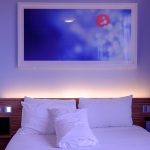In combating jetlag, tap into nature’s arsenal to swiftly realign your disrupted sleep patterns. Explore the healing power of plants like chamomile and valerian root for relaxation and improved sleep quality. Utilize mindful breathing techniques and outdoor activities to sync with your body’s natural rhythms.
Enhance your sleep environment with soothing elements like soft lighting and essential oils. Establishing routine patterns and meal times can aid in optimizing your circadian rhythm.
By integrating these natural remedies, you can efficiently conquer jetlag and restore harmony to your sleep-wake cycle. Explore these strategies to reclaim restful nights and energized days.
Understanding Jetlag and Its Effects
 Jetlag disrupts your body’s internal clock, causing a misalignment between your natural sleep-wake cycle and the new time zone you find yourself in. This disruption leads to sleep deprivation, a condition characterized by inadequate quantity or quality of sleep. The body’s internal clock, also known as the circadian rhythm, plays an important role in regulating various physiological processes, including the sleep-wake cycle. When you travel across different time zones, your circadian rhythm struggles to adjust to the new light-dark schedule, resulting in jetlag.
Jetlag disrupts your body’s internal clock, causing a misalignment between your natural sleep-wake cycle and the new time zone you find yourself in. This disruption leads to sleep deprivation, a condition characterized by inadequate quantity or quality of sleep. The body’s internal clock, also known as the circadian rhythm, plays an important role in regulating various physiological processes, including the sleep-wake cycle. When you travel across different time zones, your circadian rhythm struggles to adjust to the new light-dark schedule, resulting in jetlag.
Sleep deprivation, a common consequence of jetlag, can have a notable impact on your overall well-being. It can lead to fatigue, difficulty concentrating, mood disturbances, and impaired cognitive function. Disruptions to your circadian rhythm can further exacerbate these symptoms, making it challenging to adapt to the new time zone.
Understanding the effects of jetlag on your sleep patterns is essential in finding effective remedies to realign your internal clock. By addressing sleep deprivation and supporting your circadian rhythm, you can minimize the negative impact of jetlag on your body. Implementing strategies that promote restful sleep and help synchronize your internal clock with the new time zone can greatly improve your overall sleep quality and reduce the duration of jetlag symptoms.
Importance of Natural Remedies
Natural remedies offer a holistic approach to addressing jetlag symptoms and realigning disrupted sleep patterns by leveraging the healing properties of plants and herbs. Herbal remedies have been used for centuries to promote relaxation, improve sleep quality, and alleviate the effects of jetlag on the body.
For example, chamomile tea is known for its calming effects, which can help you unwind and prepare for sleep after a long journey. Similarly, valerian root is a natural sedative that can aid in falling asleep faster and improving overall sleep duration.
In addition to herbal remedies, incorporating good sleep hygiene practices is essential for overcoming jetlag and establishing a healthy sleep-wake cycle. Maintaining a consistent sleep schedule, creating a relaxing bedtime routine, and ensuring your sleep environment is conducive to rest can greatly impact your ability to adjust to a new time zone.
Regulating Light Exposure
Managing light exposure plays an important role in resetting your internal clock and aiding in the adjustment of your sleep patterns to a new time zone. Light therapy is a powerful tool that can help regulate your circadian rhythm effectively.
Here are five key points to keep in mind when regulating your light exposure:
-
Morning Light: Exposing yourself to natural light in the morning can help signal to your body that it’s time to wake up and start the day.
-
Avoid Blue Light: Limit exposure to artificial blue light from screens before bedtime as it can disrupt your circadian rhythm and make it harder to fall asleep.
-
Dim the Lights: In the evening, dimming the lights in your environment can signal to your body that it’s time to wind down and prepare for sleep.
-
Natural Sunlight: Spending time outdoors during the day can help regulate your internal clock and improve the quality of your sleep at night.
-
Light Exposure Timing: Pay attention to the timing of light exposure; getting bright light in the evening can delay your internal clock, making it harder to fall asleep at night.
Power of Melatonin
Exposure to light influences the production of melatonin, a hormone that plays an important role in regulating sleep-wake cycles and aligning your internal clock. Melatonin is primarily produced by the pineal gland in response to darkness, helping signal to your body that it’s time to sleep. This process is important for maintaining a healthy circadian rhythm, the internal clock that dictates when you feel sleepy or awake.
Research has shown that melatonin supplementation can be beneficial in realigning disrupted sleep patterns, such as those experienced during jetlag or shift work. By taking melatonin supplements, you can help adjust your internal clock to match the new time zone or work schedule more efficiently. However, consulting with a healthcare provider before starting any supplementation to determine the appropriate dosage and timing is recommended.
Melatonin production naturally peaks at night and decreases during the day. By understanding this natural rhythm, you can optimize your environment to support melatonin production. Dimming lights and avoiding screens close to bedtime can help enhance melatonin levels and improve sleep quality.
Herbal Sleep Aids
Enhancing your sleep quality through the use of herbal sleep aids can offer a natural alternative to support your circadian rhythm and improve your overall rest patterns. Herbal remedies have been used for centuries to promote relaxation and improve sleep quality.
Here are some herbal sleep aids that you may consider incorporating into your sleep hygiene routine:
-
Chamomile Tea: Known for its calming properties, chamomile tea can help relax the mind and body before bedtime. The herbal infusion is believed to have mild sedative effects that can aid in falling asleep faster.
-
Valerian Root: Valerian root is a herb that has been used as a natural remedy for insomnia and anxiety. It may help improve sleep quality by reducing the time it takes to fall asleep and promoting deep sleep.
-
Lavender: Lavender is often used in aromatherapy to promote relaxation and reduce stress. The scent of lavender may help improve sleep quality and increase the amount of time spent in slow-wave sleep.
-
Passionflower: Passionflower is a plant traditionally used to treat anxiety and insomnia. It may help improve sleep by increasing levels of GABA, a neurotransmitter that promotes relaxation.
-
Lemon Balm: Lemon balm is a herb from the mint family that’s known for its calming effects. It can help reduce anxiety and promote better sleep quality when consumed as an herbal infusion before bedtime.
Incorporating these herbal sleep aids into your nightly routine, along with maintaining good sleep hygiene practices, can help you achieve a more restful and rejuvenating sleep experience.
Hydration for Sleep
Curious about how hydration impacts your sleep quality? Staying properly hydrated plays a vital role in guaranteeing a good night’s rest. Your sleep environment can greatly benefit from a simple habit like drinking an adequate amount of water throughout the day. Dehydration can lead to discomfort, making it harder for you to fall asleep and stay asleep. It’s vital to maintain healthy hydration levels to support your body’s natural sleep-wake cycles.
Incorporating hydration into your routine patterns is key to improving your sleep quality. By establishing a consistent schedule for drinking water, you can help regulate your body’s internal clock and promote better sleep. Avoid excessive fluid intake close to bedtime to prevent disruptions during the night. Finding the right balance is important for achieving ideal hydration levels without causing frequent trips to the bathroom that can disturb your sleep.
Remember that your sleep environment is influenced by various factors, including hydration. Keep a water bottle by your bedside to ensure easy access to water throughout the night if needed. Prioritize hydration as part of your overall sleep hygiene routine to support a restful and rejuvenating night’s sleep. By paying attention to your hydration levels, you can positively impact your sleep patterns and overall well-being.
Mindful Breathing Techniques
Proper utilization of mindful breathing techniques can greatly impact your ability to relax and improve your sleep quality. By focusing on breath awareness, you can tap into your body’s natural relaxation response, helping to calm the mind and prepare it for rest.
Here are five key elements to contemplate when practicing mindful breathing techniques:
- Diaphragmatic Breathing: Engage your diaphragm by breathing deeply into your abdomen rather than shallowly into your chest.
- Counted Breaths: Inhale for a count of four, hold for a count of two, then exhale for a count of six to regulate your breathing pattern.
- Guided Imagery: Pair breathing with visualizations of peaceful scenes or calming images to enhance relaxation.
- Body Scan: Combine breath awareness with a mental scan of your body, releasing tension from each area as you exhale.
- Mindful Observance: Observe your breath without judgment, letting go of racing thoughts and returning your focus to the present moment.
Through these mindful breathing techniques, you can create a serene mental environment conducive to sleep. By incorporating these practices into your bedtime routine, you can train your body to unwind and signal the shift to rest, ultimately improving your overall sleep quality.
Outdoor Exercise Benefits
Engaging in outdoor exercise offers a multitude of benefits for both physical and mental well-being, making it a valuable component of a healthy lifestyle. Two popular outdoor activities known for their positive effects on well-being are forest bathing and beach running.
Forest bathing, also known as Shinrin-Yoku in Japan, involves immersing oneself in a forest environment to promote healing and relaxation. Studies have shown that spending time in nature can reduce stress levels, lower blood pressure, and boost the immune system. The phytoncides released by trees have been linked to these health benefits, making forest bathing a powerful outdoor exercise.
On the other hand, beach running not only provides the physical benefits of cardiovascular exercise but also offers a calming effect due to the sound of the waves and the open expanse of the beach. Running on sand engages more muscles than running on a flat surface, making it a challenging yet rewarding workout. The negative ions present in the sea air can also contribute to a sense of well-being and mental clarity.
Incorporating outdoor exercises like forest bathing and beach running into your routine can enhance your overall health and help realign your sleep patterns naturally. So, next time you’re looking to reset your body clock, consider stepping outside for a rejuvenating workout amidst nature’s beauty.
Adjusting Meal Times
To align your sleep patterns effectively, consider adjusting your meal times to optimize your body’s internal clock. Meal timing plays an important role in regulating your circadian rhythm, which influences your sleep-wake cycles. By strategically planning your meals, you can promote digestive health and maintain hormonal balance, ultimately aiding in the adjustment of your sleep patterns.
-
Avoid Heavy Meals Late at Night: Consuming heavy or rich foods close to bedtime can disrupt your sleep by causing indigestion, so it’s best to have your main meal earlier in the evening.
-
Prioritize Balanced Nutrients: Make sure your meals contain a balance of carbohydrates, proteins, and healthy fats to provide sustained energy throughout the day and support your body’s functions.
-
Consider Light Snacks: If you feel hungry close to bedtime, opt for light snacks like a piece of fruit or a small portion of nuts to prevent hunger pangs without overloading your digestive system.
-
Stay Hydrated: Proper hydration is essential for overall health and can also aid digestion, so remember to drink water throughout the day and limit intake close to bedtime to avoid disruptions during sleep.
-
Listen to Your Body: Pay attention to your body’s hunger cues and try to eat at consistent times each day to establish a routine that aligns with your natural circadian rhythm.
Immersion in Nature
Immerse yourself in nature to reset your body’s internal clock and realign your sleep patterns naturally. Forest bathing, also known as nature therapy, is a practice that involves immersing oneself in a natural environment to promote overall well-being. Research suggests that spending time in nature can have a significant impact on sleep quality and help regulate circadian rhythms.
When you engage in forest bathing, you expose yourself to phytoncides, which are antimicrobial compounds released by plants. These phytoncides have been shown to reduce stress levels and improve immune function. By reducing stress, your body can better regulate cortisol levels, which can, in turn, help improve your sleep patterns.
Additionally, spending time in nature can help regulate the production of melatonin, the hormone responsible for controlling your sleep-wake cycle. Natural light exposure plays an important role in this process, as it helps synchronize your circadian rhythm with the natural daylight and darkness cycle. By immersing yourself in natural light during the day, especially in the morning, you can help signal to your body when it’s time to be awake and when it’s time to sleep.
Incorporating forest bathing into your routine can be a simple yet effective way to realign your sleep patterns and combat jetlag. By connecting with nature and allowing yourself to unwind in a natural environment, you can help your body find its natural rhythm and promote restful sleep.
Benefits of Aromatherapy
Spending time in natural environments like forests can positively impact your sleep patterns, and another complementary method worth exploring is the benefits of aromatherapy. Aromatherapy, known for its various benefits, offers a natural way to enhance relaxation and relieve stress, ultimately aiding in realigning your sleep patterns. Here are some key points worth exploring:
-
Aromatherapy benefits: Aromatherapy has been shown to promote relaxation, reduce anxiety levels, and improve overall sleep quality.
-
Calming effects: Certain essential oils like lavender, chamomile, and sandalwood have calming properties that can help induce a state of relaxation conducive to sleep.
-
Stress relief: Aromatherapy can be a powerful tool for stress relief, as inhaling certain essential oils can trigger the brain to release neurotransmitters that promote relaxation.
-
Aromatherapy blends: Combining different essential oils in blends tailored to your needs can create synergistic effects that enhance the overall calming and sleep-inducing properties.
-
Sleep aid: Using aromatherapy as a part of your bedtime routine can signal to your body that it’s time to wind down, making it easier to fall asleep and stay asleep throughout the night.
Incorporating aromatherapy into your sleep hygiene routine can be a gentle yet effective way to support your body in readjusting its natural sleep patterns while providing additional benefits such as relaxation and stress relief.
Power Napping Strategies
Implementing strategic power napping techniques can greatly enhance alertness and productivity throughout the day. Nap strategies play an important role in managing energy levels and combating the midday slump. Catnaps, short naps lasting anywhere from 10 to 20 minutes, are particularly effective in boosting cognitive function without causing grogginess. These power naps are ideal for maintaining productivity and focus during the afternoon hours when drowsiness tends to peak.
To maximize the benefits of power napping, it’s vital to find the right balance in duration. Longer naps can lead to sleep inertia, a state of grogginess and disorientation, making it counterproductive. By keeping naps short and sweet, you allow your body to enter the restorative stages of sleep without delving too deeply into the sleep cycle.
Finding a quiet, dimly lit space to nap can also significantly impact the effectiveness of your power nap. Creating a sleep-conducive environment can help you relax and fall asleep faster, making the most out of your short nap window. Additionally, scheduling your naps strategically, such as right after lunch, can complement your body’s natural circadian rhythms, aiding in a quick recharge and a productivity boost for the rest of the day.
Incorporating these nap strategies into your daily routine can lead to improved alertness, enhanced cognitive function, and overall better performance.
Mindful Technology Use
To optimize your cognitive well-being, it’s important to conscientiously manage your interaction with technology. In today’s digital age, mindful technology use plays an essential role in maintaining a healthy sleep-wake cycle. Here are some evidence-based strategies to help you navigate the digital world while safeguarding your sleep patterns:
-
Digital Detox: Schedule regular periods where you disconnect from all electronic devices to give your mind a break from constant stimulation.
-
Screen Time Limits: Set a daily cap on the amount of time you spend on screens, especially before bedtime, to reduce the disruptive effects of blue light on your circadian rhythm.
-
Night Mode: Utilize night mode settings on your devices to minimize exposure to blue light in the evening, promoting the production of melatonin for better sleep quality.
-
Tech-Free Bedroom: Create a tech-free zone in your bedroom to eliminate distractions and signal to your brain that it’s time to wind down for rest.
-
Mindful Notifications: Customize your notifications to reduce unnecessary disruptions, allowing for uninterrupted relaxation and sleep preparation.
Setting Sleep Environment
Establishing an ideal sleep environment is essential for encouraging restful and rejuvenating sleep. When it comes to designing your sleep environment, consider incorporating principles of Feng Shui to promote a harmonious atmosphere that supports better sleep. Feng Shui emphasizes the importance of decluttering your space, ensuring good air quality, and incorporating soothing elements like soft lighting and comfortable bedding to create a calming oasis for rest.
To enhance your sleep environment further, you can explore natural sleep remedies and DIY methods. Essential oils such as lavender or chamomile can be diffused in your bedroom to promote relaxation and improve sleep quality. Creating a bedtime routine that includes activities like gentle stretching, meditation, or reading can signal to your body that it’s time to wind down and prepare for sleep.
When designing your sleep environment, consider factors like temperature, lighting, and noise levels to create an excellent setting for rest. Keep your bedroom cool, dark, and quiet to minimize disruptions during the night. Investing in a comfortable mattress and pillows that support your preferred sleep position can also have a substantial impact on the quality of your sleep.
Establishing Routine Patterns
Consider establishing consistent daily routines to regulate your sleep patterns effectively. Setting routine patterns can greatly impact your ability to overcome jetlag and realign your natural sleep-wake cycle. To achieve this, incorporating bedtime rituals and maintaining good sleep hygiene are crucial.
Here are five key strategies to help you establish routine patterns for better sleep:
-
Consistent Bedtime: Aim to go to bed and wake up at the same time every day, even on weekends, to regulate your body’s internal clock.
-
Create a Relaxing Bedtime Routine: Engage in calming activities before bed, such as reading a book or taking a warm bath, to signal to your body that it’s time to wind down.
-
Mindful Sleep: Practice relaxation techniques like deep breathing or meditation to quiet your mind and prepare it for restful sleep.
-
Limit Stimulants: Avoid caffeine, nicotine, and heavy meals close to bedtime, as they can disrupt your ability to fall asleep easily.
-
Optimize Your Sleep Environment: Make sure your bedroom is conducive to sleep by keeping it cool, dark, and quiet. Invest in a comfortable mattress and pillows to support quality rest.
Frequently Asked Questions
Can Jetlag Be Prevented Completely?
Jetlag can’t always be prevented completely, but you can minimize its effects by following good sleep hygiene habits. This includes maintaining regular sleep schedules, avoiding caffeine and alcohol close to bedtime, and creating a comfortable sleep environment.
Melatonin supplements can also help regulate your sleep-wake cycle. Light therapy, exercise, and staying hydrated can support your body in adjusting to new time zones and reducing jetlag symptoms.
Are There Specific Herbal Remedies for Jetlag?
When seeking a quick fix for jetlag, remember that herbal teas and homeopathic remedies are often promoted as natural solutions.
However, before you load up on chamomile or lavender-infused potions, keep in mind that scientific evidence supporting these remedies’ effectiveness in realigning sleep patterns is limited.
How Soon Should One Start Adjusting Meal Times?
When adjusting meal times for jetlag, starting a few days before your trip can be effective. By gradually shifting your eating schedule to match your destination’s time zone, your body can begin to acclimate.
This preparation can help in syncing your internal clock with the new time zone, aiding in a smoother adjustment upon arrival. Incorporating meal timing adjustments into your travel preparations can assist in minimizing the effects of jetlag.
Can Aromatherapy Alone Help With Jetlag?
Aromatherapy alone may not completely resolve jetlag, but it can offer benefits in aiding relaxation and promoting better sleep. While aromatherapy is a natural sleep aid, its effects might vary from person to person. Lavender and chamomile essential oils are commonly used for their calming properties.
Combining aromatherapy with other strategies like adjusting light exposure and meal times could enhance its effectiveness in realigning sleep patterns disrupted by jetlag.
Is It Necessary to Avoid All Technology Before Sleep?
To improve your sleep quality, limiting exposure to blue light from screens before bedtime is essential. This type of light can disrupt your body’s natural sleep-wake cycle.
Following good sleep hygiene practices, such as reducing screen time before sleep, can help you fall asleep faster and improve the overall quality of your rest.
Being mindful of these factors can contribute to a more restful night’s sleep.
Conclusion
By harnessing the power of nature’s remedies like regulating light exposure, utilizing melatonin, and incorporating herbal sleep aids, you can realign your sleep patterns and conquer jetlag.
Just as the sun rises and sets, your body too can find its natural rhythm with the help of these techniques.
Embrace the wisdom of nature to restore balance and harmony to your sleep schedule, and let the healing power of the earth guide you towards a restful night’s sleep.









